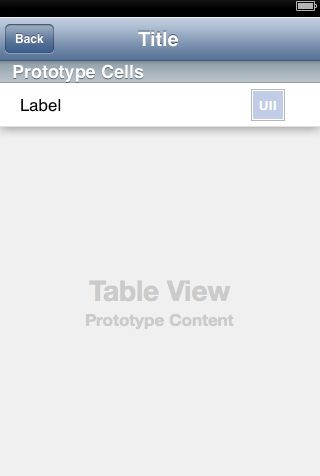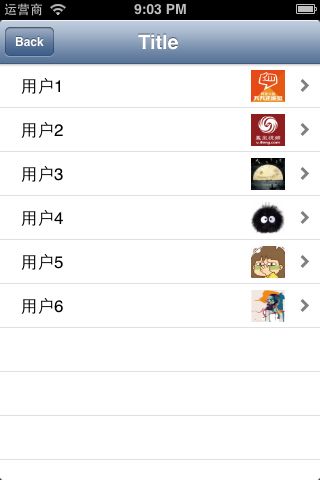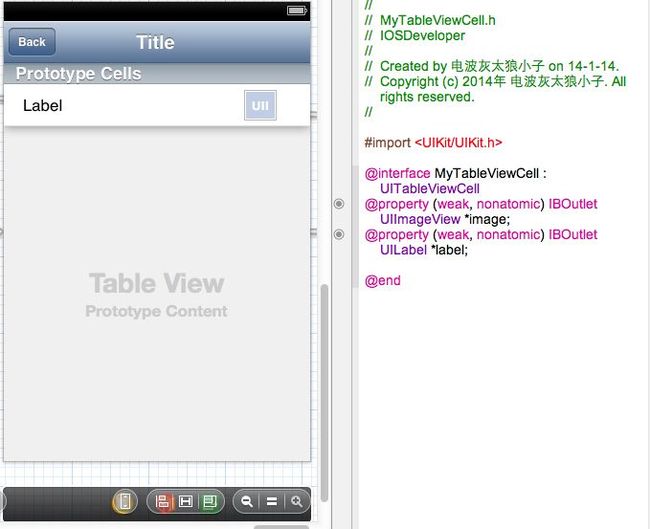- UI学习——cell的复用和自定义cell
Magnetic_h
ui学习
目录cell的复用手动(非注册)自动(注册)自定义cellcell的复用在iOS开发中,单元格复用是一种提高表格(UITableView)和集合视图(UICollectionView)滚动性能的技术。当一个UITableViewCell或UICollectionViewCell首次需要显示时,如果没有可复用的单元格,则视图会创建一个新的单元格。一旦这个单元格滚动出屏幕,它就不会被销毁。相反,它被添
- Flutter学习之九 ListView
MQ_Twist
极端很容易,平衡才是最难的。Flutter学习之八Container前言Flutter中的ListView的地位,就好比于iOS中的UITableView,算是最常用的可滚动组件之一,它可以沿一个方向线性排布所有子组件,并且它也支持列表项懒加载(在需要时才会创建)。默认构造函数我们看看ListView的默认构造函数定义:ListView({...//可滚动widget公共参数AxisscrollD
- iOS使用UIScrollView实现左右滑动UITableView和UICollectionView
泥孩儿0107
ios开发
iOS使用UIScrollView实现左右滑动UITableView和UICollectionView标签:iOS左右滑动UIScrollViewUICollectionView在UIScrollView中嵌套UITableView的文章很多,但是项目需要,需要嵌套UICollectionView,而UICollectionView和UITableView有很多不同,有些知识到现在也没搞清楚,一遍
- 简单实现浮动按钮+上滑隐藏按钮+下滑显示按钮
AlanGe
#import"SlideShowOrHideVC.h"@interfaceSlideShowOrHideVC(){CGFloatlastContentOffset;BOOLhideBtn;BOOLisBottom;}@property(nonatomic,strong)UITableView*tableView;@property(nonatomic,strong)UIButton*myButt
- IOS 21 发现界面(UITableView)单曲列表(UITableView)实现
sziitjin
IOSiosUITableView
发现界面完整效果本文实现歌单列表效果文章基于IOS20发现界面(UITableView)歌单列表(UICollectionView)实现继续实现发现界面单曲列表效果单曲列表Cell实现实现流程:1.创建Cell,及在使用UITableView的Controller控制器上注册Cell;2.获取data列表数据,并调用UITableView的reloadData(),将数据更新到列表;3.将data
- Swift Cell重用池机制以及UINib
司南_01b7
functableView(_tableView:UITableView,cellForRowAtindexPath:IndexPath)->UITableViewCell{letreuseID="taskCell5555555"//务必填写模版nib名(此处仅限于有cell模版,若无可忽略)letnib=UINib(nibName:"test5TableViewCell",bundle:nil)
- IOS 20 发现界面(UITableView)歌单列表(UICollectionView)实现
sziitjin
IOSiosUITableViewCollectionView
发现界面完整效果本文实现歌单列表效果文章基于IOS19发现界面(UITableView)快捷按钮实现继续实现发现界面歌单列表效果歌单列表Cell实现实现流程:1.创建Cell,及在使用UITableView的Controller控制器上注册Cell;2.获取data列表数据,并调用UITableView的reloadData(),将数据更新到列表;3.将data的Item数据绑定UITableVi
- tableView reloadData 刷新结束后再执行后续操作
wg刚
[self.tableViewreloadData]并不会等待tableview更新结束后才执行后续代码,而是立即执行后续代码做个试验:代码如下@interfaceViewController()@property(nonatomic,strong)UITableView*tableView;@property(nonatomic,strong)NSArray*dataArr;@end@imple
- 关于UITableView的Cell复用
bidianzhang
iOS工作数据结构iphoneios手机
UITableView是ios开发中使用率极高的一个控件,就我个人来说,几乎我做的每一个View上都有她的身影。但是很长一段时间,我对她的理解都很肤浅。对我来说触动较大的两个东西,一个是前面提到的自定义UITableViewCell,再有就是今天要提的这个复用了。
所谓复用表面意思来理解就是重复利用了。大致的工作原理就是:UITableView属于lazyloading,也就是只加载会在界面上显示
- iOS总体框架介绍和详尽说明
诗雅颂
ios移动端框架苹果
iOS是由苹果公司开发的移动操作系统,为iPhone、iPad、iPodTouch等设备提供支持。iOS采用了基于Unix的核心(称为Darwin),并采用了类似于MacOSX的图形用户界面。以下是iOS的总体框架介绍和详尽说明:UIKit框架:UIKit是构建iOS应用程序用户界面的主要框架。它包括了各种视图控制器(如UITableViewController、UIViewController)
- UICollectionView使用
搬砖行家
首先我们自定义一个UICollectionViewCell,和自定义UITableViewCell差不多,只是这里定义的是一个网格。-(id)initWithFrame:(CGRect)frame{self=[superinitWithFrame:frame];if(self){//设置CollectionViewCell中的图像框self.imageView=[[UIImageViewalloc
- UITableView实时刷新失效问题解决
风雪山神喵
要完成的UITableView是:能够在点击了UICollectionView的item之后,刷新自己。很长一段时间,都在迷惑,为什么不能点了一下之后,就能够展示正确的数据?要点很多下,点的头都晕了。。。其实解决方法是://消除数据延迟导致的失灵[selectedDayArrremoveAllObjects];[mytableViewreloadData];这样子,也有问题,就是刷新了两次。实际的
- 11、UITableView 的优化
十二月_9d09
1、正确的复用cell;2、设计统一规格的cell;3、提前计算并缓存好cell的高度(布局),因为heightForRowAtIndextPath方法是调用最频繁的方法;4、异步绘制,遇到复杂界面、遇到性能瓶颈时,往往是突破口;5、滑动时按需加载,这个在大量图片展示、网络加载的时候很管用;6、减少子视图的层级关系;7、尽量使所有的视图不透明化以及做切圆操作;8、尽量不要动态地add或remove
- View层规范
紫藤花的魂
在viewController代码里面#pragmamark-lifecycleviewDidLoadviewWillAppear...#pragmamark-UITableViewDelegatemethods#pragmamark-CustomDelegatemethods#pragmamark-eventresponse-(void)didTappedConfirmButton:(UIBut
- 'NSUnknownKeyException', reason: '[ setValue:forUndefinedKe...
叶舞清风
无语了屏幕快照2018-12-21下午3.59.59.png屏幕快照2018-12-21下午4.02.34.png[图片上传失败...(image-ff7e18-1545379428606)]
- UITableViewCell嵌套UICollectionView
myk
UITableView和UICollection的嵌套使用1.在控制器中创建TableView,设置数据源和代理-(void)viewDidLoad{[superviewDidLoad];self.arrData=[NSMutableArrayarrayWithObjects:@"末",@"将",@"于",@"禁",@"愿",@"为",@"曹",@"家",@"世",@"代",@"赴",@"汤",@
- iOS UITableViewCell 多选时改变编辑状态图片
浅宇落
UITableViewCell编辑状态时会出现多选按钮,最近项目有需求这里要改成自己的图片和去掉一下点击效果,总结一下:最终结果最终结果.png1.创建一个继承与UITableViewCell的类EditCellEditCell.h#importNS_ASSUME_NONNULL_BEGIN@interfaceEditCell:UITableViewCell/**下标数*/@property(no
- 设计模式
灰溜溜的小王子
一、编程中的六大设计原则?1.单一职责原则通俗地讲就是一个类只做一件事1.CALayer:动画和视图的显示。2.UIView:只负责事件传递、事件响应。2.开闭原则对修改关闭,对扩展开放。要考虑到后续的扩展性,而不是在原有的基础上来回修改3.接口隔离原则使用多个专门的协议、而不是一个庞大臃肿的协议,例如tableView的代理和数据源代理:UITableviewDelegate,UITableVi
- ios UITableView 使用UITableViewStyleGrouped(分组类型)顶部会有留白处理方式
90后的晨仔
方法一:CGRectframe=CGRectMake(0,0,0,CGFLOAT_MIN);self.tableView.tableHeaderView=[[UIViewalloc]initWithFrame:frame];方法二:CGRectframe=CGRectMake(0,0,0,0.0001);self.tableView.tableHeaderView=[[UIViewalloc]in
- SwiftUI -- 取消List的分割线
jancywen
iOS13List的底层是UITableView,可以直接设置UITableView的separatorStyle为none来去除分割线在iOS14中List的实现不在是UITableView了,可以设置.listStyle(SidebarListStyle()),但会有很大的边距。也可以用Scrollview+LazyVStack替代List,Thestackis"lazy,"inthatthe
- tableview
花开半夏又一年
tableview自适应高度functableView(_tableView:UITableView,heightForRowAtindexPath:IndexPath)->CGFloat{switchindexPath.section{case0:return250default:returnUITableView.automaticDimension}}方法二:functableView(_t
- UIRefreshControl
絮语时光杨
UIRefreshControl是iOS6自带的UITableView下拉刷新控件。(instancetype)init;@property(nonatomic,readonly,getter=isRefreshing)BOOLrefreshing;@property(null_resettable,nonatomic,strong)UIColor*tintColor;@property(null
- 代码规范
YannChee
ViewController的代码结构划分以后可以按如下#pragmamark-lifecycle#pragmamark-UITableViewDelegate#pragmamark-CustomDelegate#pragmamark-EventResponse#pragmamark-PrivateMethods(后期往往需要抽取重构的部分)#pragmamark-Getter&Setter
- 表格——swift
呵邢
classMovieViewController:UIViewController,UITableViewDataSource,UITableViewDelegate{//表格属性vartable:UITableView=UITableView(frame:CGRect(x:0,y:0,width:scrWidth,height:scrHeight),style:UITableViewStyle.
- iOS13 Compositional Layout
LINGSHOW
阅读原文前言UITableView和UICollectionView是我们开发者最常用的控件了,大量的流式布局需要这两个控件来实现,因此这两个控件也是Apple重点优化的对象。在往届WWDC中,我们已经受益于UITableViewDataSourcePrefetching、优化版Autolayout等带来的性能提升,以及UITableViewDragDelegate带来的原生拖拽功能。今年,App
- UITableView方法的执行顺序
Rumbles
1.它会调用代理方法确定有几行[TableViewControllernumberOfSectionsInTableView:]2.确定每行的表头高和表尾高(如果设定了HeardView和FooterView)[TableViewControllertableView:heightForHeaderInSection:][TableViewControllertableView:heightFor
- iOS tableViewCell最右边显示箭头,字符,自定义分割线
Lee坚武
效果如图:image.png1.添加iOS系统自带的cell的箭头cell.accessoryType=UITableViewCellAccessoryDisclosureIndicator;2.去掉tableviewcell的间隔下划线_tableView.separatorStyle=UITableViewCellSeparatorStyleNone;3.添加自定义间隔线,加在下面的这个方法里
- UITableView 轻松自定义多选cell 不使用系统样式
Adgerc
1、先看效果UITableView.gif2、需要什么效果1.点击全选需要全选cell2.在全选状态下,取消任意一个,全选按钮为normal转态3.一个一个选择,直到全部选择,全选按钮为selected状态3、实现3.1.在cell中添加一个按钮或者图片,用来显示选择或者未选择中的转态,在初始化时默认设为未选择的转态或者图片,和透明度为0或hidden=YES,我使用的是按钮做这个状态的现实,只需
- iOS开发笔记-113:兼容ios14
原味蛋炒饭
1:iOS14中UITableViewCell如果子控件是加到cell上的会被cell的contentView所遮挡,contentView会在最上层。所以按钮UIbutton之类的要加在contentView上2:刘海屏statusBarFrame.size.height由44变成了48
- 设计模式
荷码人生
六大设计原则:单一职责原则、依赖倒置原则、开闭原则、里氏替换原则、接口隔离原则、迪米特法则;单一职责原则:一个类只负责一个事(UIView,Calayer)开闭原则:对修改关闭、对扩展开发。(避免对类的反复修改,类的数据结构设定后,可利用扩展的方式,修改)接口隔离原则:(UITableView的两个协议)使用多个专门协议,避免庞大协议:dataSource(数据源),delegate(回调代理事件
- 遍历dom 并且存储(将每一层的DOM元素存在数组中)
换个号韩国红果果
JavaScripthtml
数组从0开始!!
var a=[],i=0;
for(var j=0;j<30;j++){
a[j]=[];//数组里套数组,且第i层存储在第a[i]中
}
function walkDOM(n){
do{
if(n.nodeType!==3)//筛选去除#text类型
a[i].push(n);
//con
- Android+Jquery Mobile学习系列(9)-总结和代码分享
白糖_
JQuery Mobile
目录导航
经过一个多月的边学习边练手,学会了Android基于Web开发的毛皮,其实开发过程中用Android原生API不是很多,更多的是HTML/Javascript/Css。
个人觉得基于WebView的Jquery Mobile开发有以下优点:
1、对于刚从Java Web转型过来的同学非常适合,只要懂得HTML开发就可以上手做事。
2、jquerym
- impala参考资料
dayutianfei
impala
记录一些有用的Impala资料
1. 入门资料
>>官网翻译:
http://my.oschina.net/weiqingbin/blog?catalog=423691
2. 实用进阶
>>代码&架构分析:
Impala/Hive现状分析与前景展望:http
- JAVA 静态变量与非静态变量初始化顺序之新解
周凡杨
java静态非静态顺序
今天和同事争论一问题,关于静态变量与非静态变量的初始化顺序,谁先谁后,最终想整理出来!测试代码:
import java.util.Map;
public class T {
public static T t = new T();
private Map map = new HashMap();
public T(){
System.out.println(&quo
- 跳出iframe返回外层页面
g21121
iframe
在web开发过程中难免要用到iframe,但当连接超时或跳转到公共页面时就会出现超时页面显示在iframe中,这时我们就需要跳出这个iframe到达一个公共页面去。
首先跳转到一个中间页,这个页面用于判断是否在iframe中,在页面加载的过程中调用如下代码:
<script type="text/javascript">
//<!--
function
- JAVA多线程监听JMS、MQ队列
510888780
java多线程
背景:消息队列中有非常多的消息需要处理,并且监听器onMessage()方法中的业务逻辑也相对比较复杂,为了加快队列消息的读取、处理速度。可以通过加快读取速度和加快处理速度来考虑。因此从这两个方面都使用多线程来处理。对于消息处理的业务处理逻辑用线程池来做。对于加快消息监听读取速度可以使用1.使用多个监听器监听一个队列;2.使用一个监听器开启多线程监听。
对于上面提到的方法2使用一个监听器开启多线
- 第一个SpringMvc例子
布衣凌宇
spring mvc
第一步:导入需要的包;
第二步:配置web.xml文件
<?xml version="1.0" encoding="UTF-8"?>
<web-app version="2.5"
xmlns="http://java.sun.com/xml/ns/javaee"
xmlns:xsi=
- 我的spring学习笔记15-容器扩展点之PropertyOverrideConfigurer
aijuans
Spring3
PropertyOverrideConfigurer类似于PropertyPlaceholderConfigurer,但是与后者相比,前者对于bean属性可以有缺省值或者根本没有值。也就是说如果properties文件中没有某个bean属性的内容,那么将使用上下文(配置的xml文件)中相应定义的值。如果properties文件中有bean属性的内容,那么就用properties文件中的值来代替上下
- 通过XSD验证XML
antlove
xmlschemaxsdvalidationSchemaFactory
1. XmlValidation.java
package xml.validation;
import java.io.InputStream;
import javax.xml.XMLConstants;
import javax.xml.transform.stream.StreamSource;
import javax.xml.validation.Schem
- 文本流与字符集
百合不是茶
PrintWrite()的使用字符集名字 别名获取
文本数据的输入输出;
输入;数据流,缓冲流
输出;介绍向文本打印格式化的输出PrintWrite();
package 文本流;
import java.io.FileNotFound
- ibatis模糊查询sqlmap-mapping-**.xml配置
bijian1013
ibatis
正常我们写ibatis的sqlmap-mapping-*.xml文件时,传入的参数都用##标识,如下所示:
<resultMap id="personInfo" class="com.bijian.study.dto.PersonDTO">
<res
- java jvm常用命令工具——jdb命令(The Java Debugger)
bijian1013
javajvmjdb
用来对core文件和正在运行的Java进程进行实时地调试,里面包含了丰富的命令帮助您进行调试,它的功能和Sun studio里面所带的dbx非常相似,但 jdb是专门用来针对Java应用程序的。
现在应该说日常的开发中很少用到JDB了,因为现在的IDE已经帮我们封装好了,如使用ECLI
- 【Spring框架二】Spring常用注解之Component、Repository、Service和Controller注解
bit1129
controller
在Spring常用注解第一步部分【Spring框架一】Spring常用注解之Autowired和Resource注解(http://bit1129.iteye.com/blog/2114084)中介绍了Autowired和Resource两个注解的功能,它们用于将依赖根据名称或者类型进行自动的注入,这简化了在XML中,依赖注入部分的XML的编写,但是UserDao和UserService两个bea
- cxf wsdl2java生成代码super出错,构造函数不匹配
bitray
super
由于过去对于soap协议的cxf接触的不是很多,所以遇到了也是迷糊了一会.后来经过查找资料才得以解决. 初始原因一般是由于jaxws2.2规范和jdk6及以上不兼容导致的.所以要强制降为jaxws2.1进行编译生成.我们需要少量的修改:
我们原来的代码
wsdl2java com.test.xxx -client http://.....
修改后的代
- 动态页面正文部分中文乱码排障一例
ronin47
公司网站一部分动态页面,早先使用apache+resin的架构运行,考虑到高并发访问下的响应性能问题,在前不久逐步开始用nginx替换掉了apache。 不过随后发现了一个问题,随意进入某一有分页的网页,第一页是正常的(因为静态化过了);点“下一页”,出来的页面两边正常,中间部分的标题、关键字等也正常,唯独每个标题下的正文无法正常显示。 因为有做过系统调整,所以第一反应就是新上
- java-54- 调整数组顺序使奇数位于偶数前面
bylijinnan
java
import java.util.Arrays;
import java.util.Random;
import ljn.help.Helper;
public class OddBeforeEven {
/**
* Q 54 调整数组顺序使奇数位于偶数前面
* 输入一个整数数组,调整数组中数字的顺序,使得所有奇数位于数组的前半部分,所有偶数位于数组的后半
- 从100PV到1亿级PV网站架构演变
cfyme
网站架构
一个网站就像一个人,存在一个从小到大的过程。养一个网站和养一个人一样,不同时期需要不同的方法,不同的方法下有共同的原则。本文结合我自已14年网站人的经历记录一些架构演变中的体会。 1:积累是必不可少的
架构师不是一天练成的。
1999年,我作了一个个人主页,在学校内的虚拟空间,参加了一次主页大赛,几个DREAMWEAVER的页面,几个TABLE作布局,一个DB连接,几行PHP的代码嵌入在HTM
- [宇宙时代]宇宙时代的GIS是什么?
comsci
Gis
我们都知道一个事实,在行星内部的时候,因为地理信息的坐标都是相对固定的,所以我们获取一组GIS数据之后,就可以存储到硬盘中,长久使用。。。但是,请注意,这种经验在宇宙时代是不能够被继续使用的
宇宙是一个高维时空
- 详解create database命令
czmmiao
database
完整命令
CREATE DATABASE mynewdb USER SYS IDENTIFIED BY sys_password USER SYSTEM IDENTIFIED BY system_password LOGFILE GROUP 1 ('/u01/logs/my/redo01a.log','/u02/logs/m
- 几句不中听却不得不认可的话
datageek
1、人丑就该多读书。
2、你不快乐是因为:你可以像猪一样懒,却无法像只猪一样懒得心安理得。
3、如果你太在意别人的看法,那么你的生活将变成一件裤衩,别人放什么屁,你都得接着。
4、你的问题主要在于:读书不多而买书太多,读书太少又特爱思考,还他妈话痨。
5、与禽兽搏斗的三种结局:(1)、赢了,比禽兽还禽兽。(2)、输了,禽兽不如。(3)、平了,跟禽兽没两样。结论:选择正确的对手很重要。
6
- 1 14:00 PHP中的“syntax error, unexpected T_PAAMAYIM_NEKUDOTAYIM”错误
dcj3sjt126com
PHP
原文地址:http://www.kafka0102.com/2010/08/281.html
因为需要,今天晚些在本机使用PHP做些测试,PHP脚本依赖了一堆我也不清楚做什么用的库。结果一跑起来,就报出类似下面的错误:“Parse error: syntax error, unexpected T_PAAMAYIM_NEKUDOTAYIM in /home/kafka/test/
- xcode6 Auto layout and size classes
dcj3sjt126com
ios
官方GUI
https://developer.apple.com/library/ios/documentation/UserExperience/Conceptual/AutolayoutPG/Introduction/Introduction.html
iOS中使用自动布局(一)
http://www.cocoachina.com/ind
- 通过PreparedStatement批量执行sql语句【sql语句相同,值不同】
梦见x光
sql事务批量执行
比如说:我有一个List需要添加到数据库中,那么我该如何通过PreparedStatement来操作呢?
public void addCustomerByCommit(Connection conn , List<Customer> customerList)
{
String sql = "inseret into customer(id
- 程序员必知必会----linux常用命令之十【系统相关】
hanqunfeng
Linux常用命令
一.linux快捷键
Ctrl+C : 终止当前命令
Ctrl+S : 暂停屏幕输出
Ctrl+Q : 恢复屏幕输出
Ctrl+U : 删除当前行光标前的所有字符
Ctrl+Z : 挂起当前正在执行的进程
Ctrl+L : 清除终端屏幕,相当于clear
二.终端命令
clear : 清除终端屏幕
reset : 重置视窗,当屏幕编码混乱时使用
time com
- NGINX
IXHONG
nginx
pcre 编译安装 nginx
conf/vhost/test.conf
upstream admin {
server 127.0.0.1:8080;
}
server {
listen 80;
&
- 设计模式--工厂模式
kerryg
设计模式
工厂方式模式分为三种:
1、普通工厂模式:建立一个工厂类,对实现了同一个接口的一些类进行实例的创建。
2、多个工厂方法的模式:就是对普通工厂方法模式的改进,在普通工厂方法模式中,如果传递的字符串出错,则不能正确创建对象,而多个工厂方法模式就是提供多个工厂方法,分别创建对象。
3、静态工厂方法模式:就是将上面的多个工厂方法模式里的方法置为静态,
- Spring InitializingBean/init-method和DisposableBean/destroy-method
mx_xiehd
javaspringbeanxml
1.initializingBean/init-method
实现org.springframework.beans.factory.InitializingBean接口允许一个bean在它的所有必须属性被BeanFactory设置后,来执行初始化的工作,InitialzingBean仅仅指定了一个方法。
通常InitializingBean接口的使用是能够被避免的,(不鼓励使用,因为没有必要
- 解决Centos下vim粘贴内容格式混乱问题
qindongliang1922
centosvim
有时候,我们在向vim打开的一个xml,或者任意文件中,拷贝粘贴的代码时,格式莫名其毛的就混乱了,然后自己一个个再重新,把格式排列好,非常耗时,而且很不爽,那么有没有办法避免呢? 答案是肯定的,设置下缩进格式就可以了,非常简单: 在用户的根目录下 直接vi ~/.vimrc文件 然后将set pastetoggle=<F9> 写入这个文件中,保存退出,重新登录,
- netty大并发请求问题
tianzhihehe
netty
多线程并发使用同一个channel
java.nio.BufferOverflowException: null
at java.nio.HeapByteBuffer.put(HeapByteBuffer.java:183) ~[na:1.7.0_60-ea]
at java.nio.ByteBuffer.put(ByteBuffer.java:832) ~[na:1.7.0_60-ea]
- Hadoop NameNode单点问题解决方案之一 AvatarNode
wyz2009107220
NameNode
我们遇到的情况
Hadoop NameNode存在单点问题。这个问题会影响分布式平台24*7运行。先说说我们的情况吧。
我们的团队负责管理一个1200节点的集群(总大小12PB),目前是运行版本为Hadoop 0.20,transaction logs写入一个共享的NFS filer(注:NetApp NFS Filer)。
经常遇到需要中断服务的问题是给hadoop打补丁。 DataNod



